July 12, 2018
Bliss Betzen attends Alliance for Science Speaking Science workshop

Bliss Betzen finished the first year of her master's degree in May. She advanced her knowledge of plant genetics, but she didn't have much experience talking to people about her research.
That changed rapidly when she attended a Speaking Science workshop at the Cornell Alliance for Science in late June. Betzen received a crash course in talking about her research. First, she learned to develop a message triangle with a challenge, a solution and a call to action; then, she learned how to stick to that message during interviews with journalists. She also explored branding on social media and telling personal stories to engage non-expert audiences with her background and research.
Betzen, who is advised by Professor Eduard Akhunov in the plant pathology department, said the workshop gave her a new appreciation for science communication.
"Being aware of what's important to me and what people need to know about my research and why I'm doing it — having that solidified as a tool in my toolbox is the big thing I learned," she said.
Betzen found the storytelling portion of the workshop particularly challenging. Led by the Story Collider, participants were instructed to choose a particular event in their lives and tell a personal story to pique the interest of listeners. Although it was "very difficult" to do, Betzen succeeded in crafting a story and was one of a few participants selected to present to the rest of the workshop at the end of the session.
"The ultimate goal is for your message to come through. You start by hooking people in — they want to know more. You answer with the message triangle: this is why you should want to know more," Betzen said.
Her story explained that although she was raised in a small town and is now studying agricultural science, she did not grow up in agriculture. She told a comical story about how she came to first drive a tractor at age 18 during her summer job for K-State Research and Extension in southeast Kansas and the field technician who helped her learn what she needed to know. After looking at the funny side of her path, she addressed the serious issue of the stigma surrounding agricultural sciences. People tend to think agriculture isn't a real science or that the problems are simple, but in reality, Betzen said, agricultural research is trying to solve very big problems for the world.
The exercise helped Betzen understand how to build an effective story.
"Communicating the paths and challenges of being a scientist — it doesn't have to be all about your research, but how you are communicating the struggles in science, and that scientists are real people — that's something that really defines a story," she said.
The Cornell Alliance for Science seeks to promote access to scientific innovation as a means of enhancing food security, improving environmental sustainability and raising the quality of life globally. Find out more about Alliance for Science short courses.
Science communication training opportunities are available at K-State via the Kansas Science Communication Initiative.
